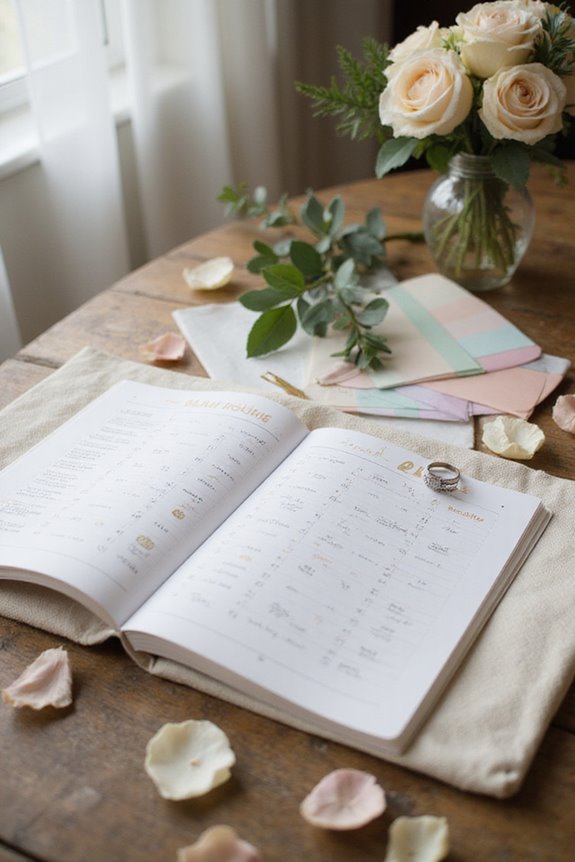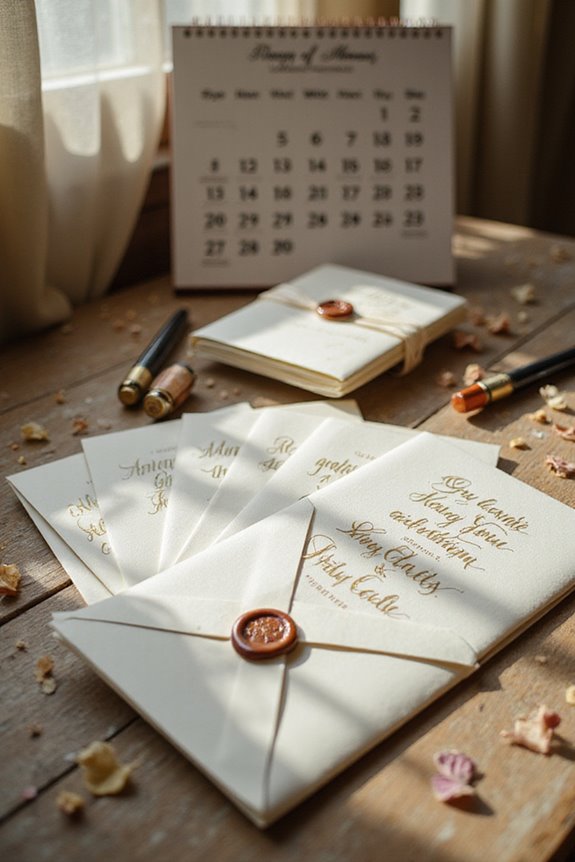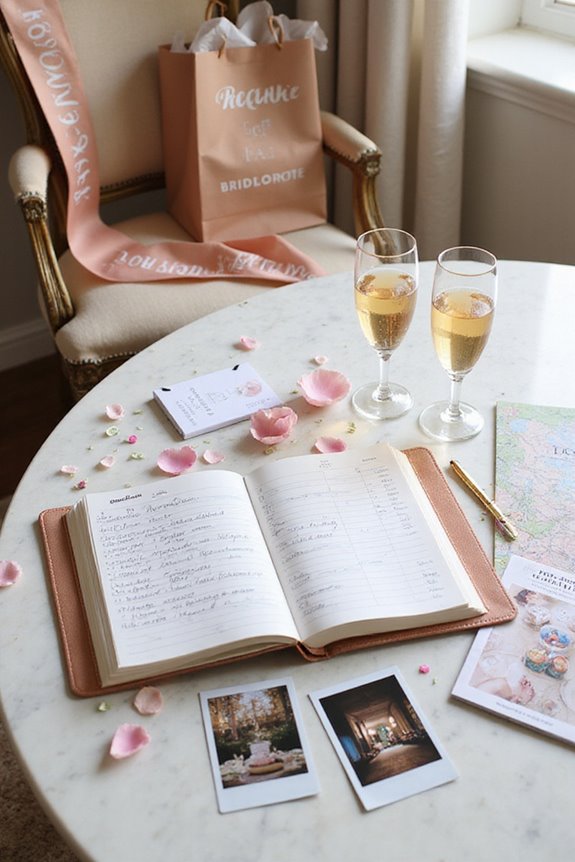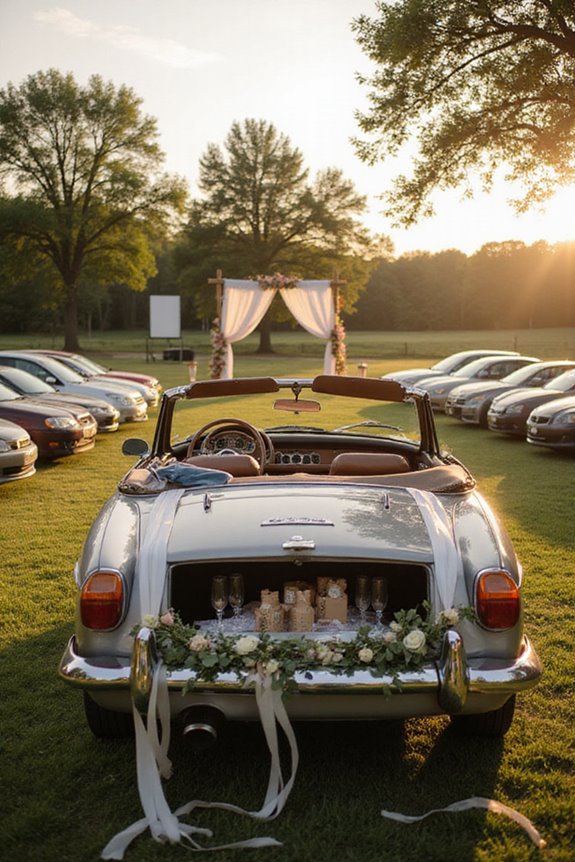When should we start planning our wedding? Ideally, we should kick things off about 12 to 18 months in advance. This gives us enough time to secure our dream venue, book vendors, and create a solid guest list without feeling rushed. If we’re reflecting on a destination wedding, starting even earlier is a smart move! Plus, tackling small tasks along the way helps keep stress levels down. There’s so much more to ponder, so let’s plunge into it!
Key Takeaways
- Start wedding planning ideally 18–24 months before your desired date to allow ample time for arrangements.
- Book key vendors like caterers and photographers 24–13 months prior for availability.
- Finalize your guest list and send invitations around six months before the wedding.
- Secure your venue as early as two years in advance to ensure your preferred date.
- Begin shopping for attire 12 months in advance to accommodate fittings and alterations.
Understanding Average Engagement Lengths
So, you’re thinking about when to start planning your wedding, and one of the first things we should tackle is understanding how long engagements typically last. The average engagement duration in the U.S. is about 15 months, but it can really vary. Some couples engage after just a month, while others might take years. For instance, folks in Ohio tend to have much longer engagements, averaging 47.5 months!
These regional differences highlight how personal circumstances and local customs play into timing. If you feel the urge to book your dream venue or save up for that perfect ring, consider extending your engagement. It’s all about what works best for you as a couple. Remember, there’s no one-size-fits-all when it comes to love!
Recommended Planning Timelines
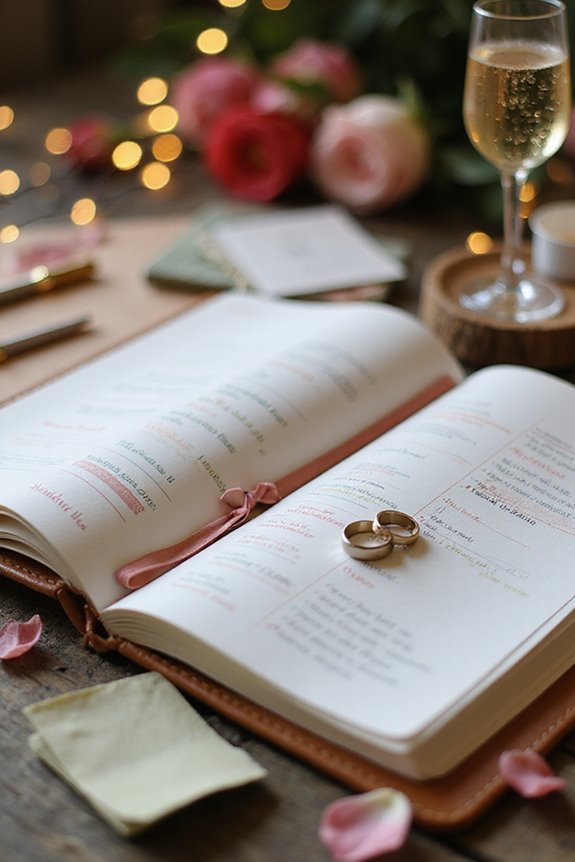
When we start planning our wedding, it can feel a bit overwhelming, especially if we’re unsure where to begin. A solid timeline is essential. Ideally, we should start 18–24 months in advance. This gives us enough time to gather inspiration and secure our dream venue. Booking key vendors like the caterer and photographer should happen about 24–13 months out to avoid conflicts.
Around 12 months before, we’ll want to explore dress shopping and create our wedding website. A-line silhouettes provide a flattering fit and are a popular choice among brides, making them a great option to consider while dress shopping. Six months prior, it’s all about finalizing the guest list and sending out invitations. Remember, while these timelines are helpful, there’s always room for timeline flexibility. Let’s enjoy the process, one step at a time!
Key Milestones in Wedding Planning
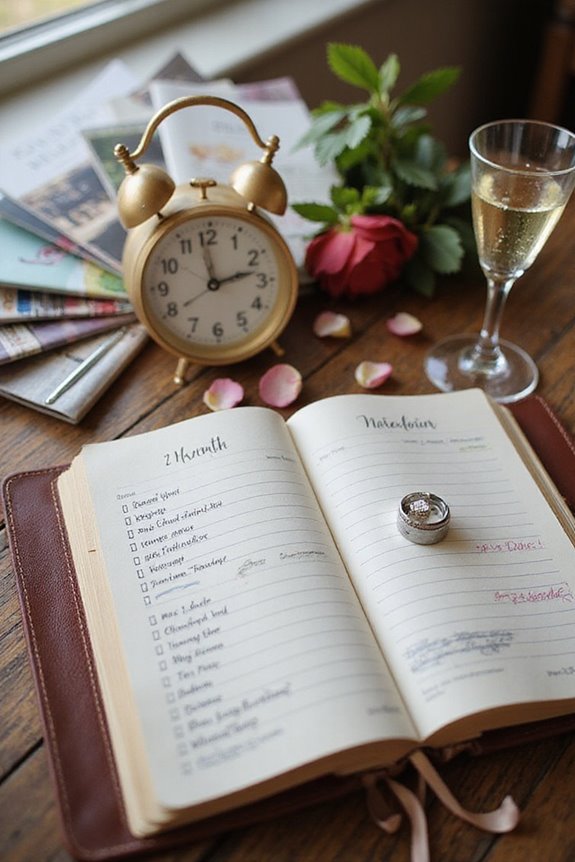
Planning a wedding involves a lot more than just picking a date and saying “I do.” As we move into the nitty-gritty of wedding planning, it’s helpful to focus on key milestones that can keep us organized and on track.
Start with Your Guest List****
Let’s kick things off by compiling that guest list early—ideally 12+ months out. This way, we can tackle save-the-dates around 9-12 months before the big day.
Get to Attire Shopping****
Don’t forget attire shopping! Starting 12 months in advance gives us ample time for fittings and alterations. Proper fit is crucial for comfort during long wedding events, ensuring we can enjoy every moment of our special day.
Factors Influencing Your Planning Start Date
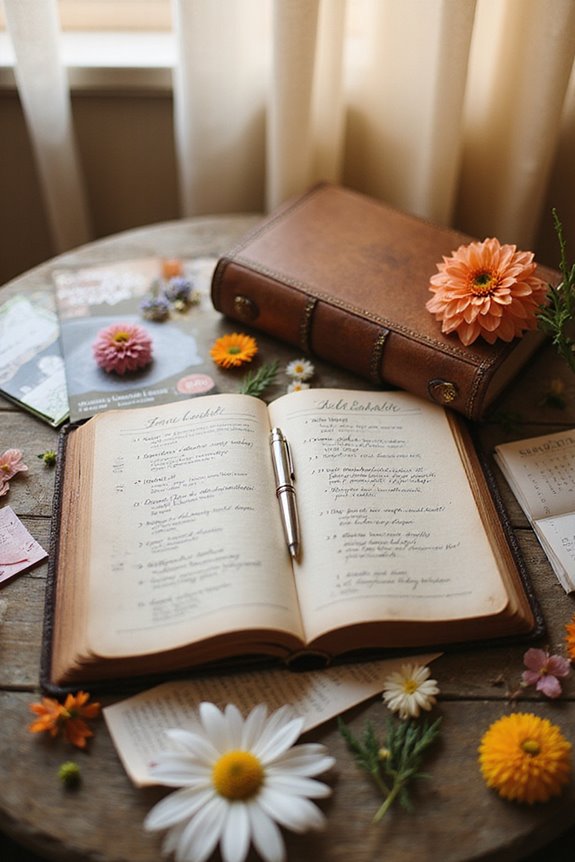
Choosing the right time to start planning your wedding can feel a bit overwhelming, especially with all the factors to take into account. First, let’s think about your guest list. A larger list means you’ll need more time for venue selection and budget considerations. Then, consider cultural traditions that might influence pre-wedding events.
If you’re planning a destination wedding, those logistics require even earlier planning. Technology can be your friend here; apps can help streamline the process. Plus, don’t forget regional variations—some cultures start planning months earlier due to family involvement. Finally, seasonal factors matter too; aligning with popular wedding months can impact your planning timeline. Additionally, customizable options for wedding dresses can be an important aspect to consider as you plan your wedding style and theme. So, let’s get organized and start this journey together!
The Importance of Venue Booking
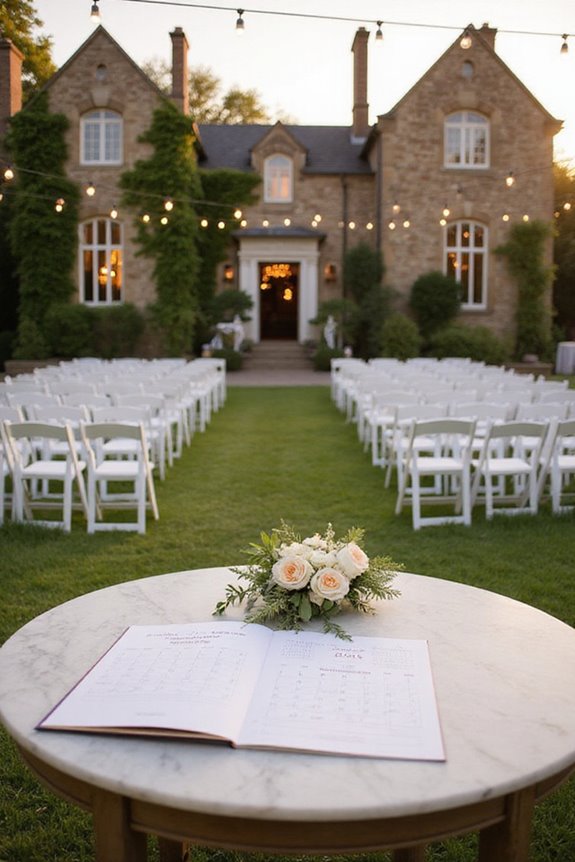
Securing your venue is a big step in the wedding planning process, and it can really set the tone for everything that follows. With popular venues booking out over a year in advance, we should start considering our venue selection strategies early. By planning a booking timeline, we can avoid the heartache of losing our dream location to another couple.
If we have a specific date in mind, let’s aim for booking up to two years ahead. This way, we can relax knowing we have a solid foundation. Plus, an early commitment allows us to focus on other details like décor and catering later. So, let’s tackle venue booking first; it’s the key to a smooth planning experience!
Vendor Booking Essentials
When it comes to booking your wedding vendors, timing can truly make a difference. By doing it early, we can secure our top choices and avoid last-minute stress. For photographers and videographers, booking 12 to 18 months out is ideal. We should review portfolios and align our styles before diving into contract negotiations.
Caterers and florists typically need 9 to 12 months’ notice, so let’s schedule tastings and consultations early. This guarantees we can customize menus and floral designs to our liking.
Lastly, for DJs or live music, booking them 9 to 12 months in advance helps us discuss playlists and avoid surprises. Effective vendor communication is key to making our big day go smoothly!
Short Engagements and Quick Planning
Planning a wedding on a tight timeline can feel a bit overwhelming, but don’t worry, we’ve got your back! Short engagement advantages are plentiful, like saving money. We can avoid costly extras by focusing on the essentials. Let’s explore quick planning strategies.
First, let’s set a budget and draft our guest list right away. Picking a wedding style early helps us make faster decisions. Securing a venue quickly is vital; the sooner we book, the better!
We can create a checklist to manage tasks and involve friends for DIY projects. Don’t hesitate to hire a planner specializing in quick turnarounds as they can help streamline the process. With a little creativity and teamwork, we can pull off a beautiful wedding without losing our minds!
Typical Wedding Day Timeframes
After tackling the whirlwind of short engagement planning, it’s time to think about how to structure our wedding day. The ceremony structure usually lasts about 20 to 30 minutes, though it can stretch longer depending on traditions. Civil ceremonies are typically shorter, around 15 to 20 minutes—perfect for those who want to keep it simple!
After the vows, we’ll enjoy a cocktail hour lasting about 60 minutes. It’s the perfect time for guests to mingle while we take photos. This break helps prevent a mad dash at the reception entrance and sets a relaxed vibe. Furthermore, table numbers play a crucial role in ensuring guests find their seats easily, enhancing the overall reception décor.
Let’s remember, timing is key! With careful planning, we can guarantee our special day flows smoothly and joyfully.
Action Items for Each Planning Phase
Starting the wedding planning journey can feel a bit overwhelming, but breaking it down into manageable phases makes it much easier.
Initial Planning Phase
Let’s kick things off by announcing our engagement and setting a budget. We should book key vendors like the venue and photographer early on. Don’t forget those save-the-dates! This is also a great time to consider using wedding planning books to help organize tasks and timelines effectively.
Midway Planning Phase
Next, we can finalize venue details and order invitations. It’s also time to select our wedding rings and nail down event dates like parties or dinners.
Late Planning Phase
Now, we’ll apply for a marriage license and confirm vendor contracts. Compiling RSVPs and arranging transportation is essential.
Final Preparation Phase
Finally, we’ll organize day-of materials and conduct dress fittings. Let’s get excited; we’re almost there!
Tips for a Successful Wedding Planning Experience
Wedding planning can feel like a maze, but it doesn’t have to be stressful. To start, let’s tackle the wedding budget. We should list essential expenses like the venue, catering, and floral arrangements, while keeping a close eye on our guest list. Remember, trimming the guest list can save us a chunk of change!
Next, communication is key. Regular check-ins with each other and vendors will keep everyone on the same page. We might also want to contemplate hiring a day-of coordinator to ease the load.
Lastly, let’s stay organized. Timelines and checklists can be our best friends in this journey. By breaking down tasks, we’ll keep the planning fun and manageable. Happy planning!
Frequently Asked Questions
How Can I Involve My Partner in the Planning Process?
To involve our partner in the planning process, let’s prioritize shared responsibilities and joint decision making. By collaborating on tasks, discussing ideas openly, and celebrating each milestone, we’ll create a memorable experience together.
What Are the Best Ways to Manage Wedding Planning Stress?
Isn’t it easy to feel overwhelmed by wedding planning? We can manage stress through mindfulness techniques and effective budget management, ensuring we enjoy the journey together while keeping our focus on what truly matters—our love.
Should I Hire a Wedding Planner or Do It Myself?
When considering whether to hire a wedding planner or tackle DIY planning, we should weigh wedding planner pros, like stress reduction and expertise, against DIY planning tips that can save money but require significant time and organization.
How Do I Handle Family Disagreements About the Wedding?
Handling family disagreements about the wedding takes effort. We’ve found that effective family communication and compromise strategies can bridge gaps. Let’s prioritize our wishes while respecting others, ensuring everyone feels valued throughout the planning process.
What Are Some Creative Ways to Personalize My Wedding?
To personalize our wedding, let’s consider customized decorations that reflect our style and unique vows expressing our love story. Incorporating these elements will create a memorable experience for us and our guests.

